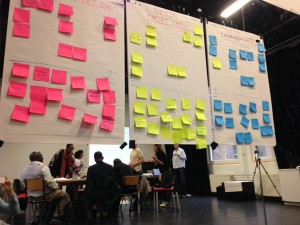Interview ‘Collaboration for reducing youth recidivism’
Interview ‘Collaboration for reducing youth recidivism’
Collaboration for reducing youth recidivism
“Of course the context is different, but youth is youth, no matter where you are.” says Lucy Waithaka from Kenya. She is one of the guests of the Good Youth Prison week, which took place last week. With an art sale, international conference and forum meeting, organiser Young in Prison (YiP) boosts dialogue about innovative solutions for youth in conflict with the law.
During the conference innovators from Malawi, South Africa, Kenya, United States, Turkey, Costa Rica and the Netherlands worked on a shared vision and advocacy strategy for good youth prisons. The basis for their collaboration is Innovate2Empower, an online community where they share best-practices and discuss their ways of working with young (ex-)offenders. Lucy herself works at Yaden, a Kenyan organisation committed to reducing youth recidivism in the country. In a short interview she talks about her experience with Innovate2Empower and her time at the Good Youth Prison week.
What have you been doing the past days?
We have exchanged a lot on what we are doing in our individual projects and are thinking about how we can collaborate even more on an international level to have more impact. It is really to see that everyone is asking questions to each other, because they are generally curious and passionate about the topic.
How do you experience Innovate2Empower?
The platform is a great way of bringing people together and learning from each other. When you talk to people from other countries you realize that many of the problems you face are the same. Of course the context is different, but youth is youth, no matter where you are. For example, Noran Sanford (US, Growing Change) told us about the disconnectedness between different organizations in the process from imprisonment to reintegration and I thought for myself ‘we don’t even have a system for this in Kenya, but we encounter the same difficulty of offering youth in conflict with the law a good and comprehensive program’. This exchange is of great added value for Yaden, for all of us.
What exactly is this added value you talk about?
As Yaden we only started a year ago and it is very useful for us to have partners working on the same topic. In Kenya we got in touch with another initiative which has worked in prisons for over 20 years. In a practical  sense, they give us access to people and places to work with through their own connections. We are not competitors, we collaborate. From the Netherlands, I will definitely take the idea of the Youthlab with me back home. I have seen how empowered these youths are to talk to people about their experiences and advice on future policy. It would be great to work with ex-offenders in this way in Kenya too! And another example is a program in
sense, they give us access to people and places to work with through their own connections. We are not competitors, we collaborate. From the Netherlands, I will definitely take the idea of the Youthlab with me back home. I have seen how empowered these youths are to talk to people about their experiences and advice on future policy. It would be great to work with ex-offenders in this way in Kenya too! And another example is a program in
the UK, where they have their own radio-station run by offenders in the prison. There are music hours, talk-shows about suicidal thoughts, depression, people share their stories and have contact with their families, friends and broader, civil society. I think this sparks creativity and connectedness. We will discuss if we can do something similar, working with media more!
Are you a professional working in the area of juvenile justice? Are you challenging the status quo for youth in conflict with the law? Innovate2Empower invites you to discover, connect, engage.
